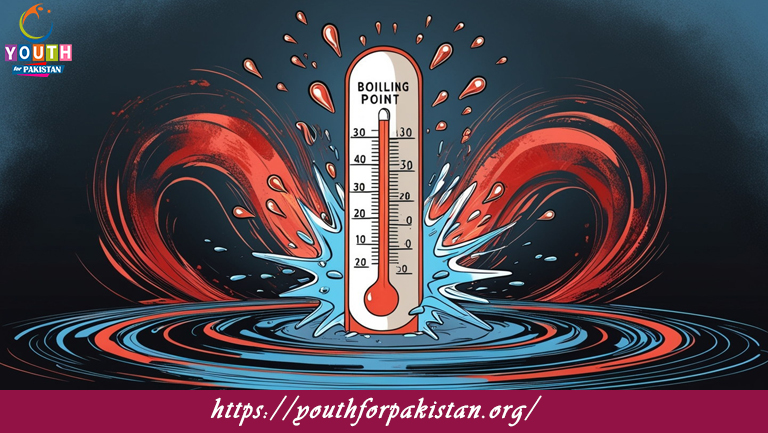Welcome to the Boiling Point And External Pressure MDCAT MCQs with Answers. In this post, we have shared Boiling Point And External Pressure Multiple Choice Questions and Answers for PMC MDCAT 2024. Each question in MDCAT Chemistry offers a chance to enhance your knowledge regarding Boiling Point And External Pressure MCQs in this MDCAT Online Test.
Boiling point is defined as the temperature at which:
a) Vapor pressure equals atmospheric pressure
b) Liquid turns into a solid
c) Vapor pressure is less than atmospheric pressure
d) Liquid turns into gas at room temperature
As the external pressure increases, the boiling point of a liquid:
a) Increases
b) Decreases
c) Remains constant
d) Decreases first and then increases
What happens to the boiling point of water at high altitudes where atmospheric pressure is lower?
a) It increases
b) It decreases
c) It remains the same
d) It becomes zero
Which of the following liquids will have the highest boiling point at a given external pressure?
a) Ether
b) Alcohol
c) Water
d) Mercury
If a liquid has a high vapor pressure at a given temperature, its boiling point is likely to be:
a) High
b) Low
c) Unchanged
d) Independent of vapor pressure
Which of the following statements is true regarding boiling point and pressure?
a) Boiling point decreases with an increase in pressure
b) Boiling point is independent of external pressure
c) Boiling point increases with an increase in pressure
d) Boiling point decreases with an increase in temperature
What is the boiling point of water at sea level (1 atm)?
a) 90°C
b) 95°C
c) 100°C
d) 110°C
At what pressure does water boil at 120°C?
a) 1 atm
b) 1.5 atm
c) 2 atm
d) 0.5 atm
The boiling point of a liquid at reduced pressure compared to its boiling point at 1 atm is:
a) Higher
b) Lower
c) Same
d) It depends on the liquid
Which of the following factors does not affect the boiling point of a liquid?
a) External pressure
b) Altitude
c) Surface area
d) Intermolecular forces
At higher altitudes, the cooking time of food is:
a) Increased
b) Decreased
c) Unchanged
d) Dependent on the type of food
The boiling point of a liquid is primarily determined by:
a) The external pressure
b) The volume of the liquid
c) The surface area
d) The type of container
In a vacuum, the boiling point of water:
a) Increases
b) Decreases
c) Remains constant
d) Is the same as at 1 atm pressure
When the atmospheric pressure is greater than 1 atm, the boiling point of a liquid:
a) Is less than its normal boiling point
b) Is equal to its normal boiling point
c) Is greater than its normal boiling point
d) Does not change
Boiling occurs when the vapor pressure of the liquid:
a) Is greater than atmospheric pressure
b) Is less than atmospheric pressure
c) Equals atmospheric pressure
d) Is equal to zero
Which of the following will lower the boiling point of a liquid?
a) Increasing the external pressure
b) Decreasing the external pressure
c) Adding a non-volatile solute
d) Decreasing the temperature
If the external pressure is decreased, the boiling point of water will:
a) Increase
b) Decrease
c) Remain the same
d) Fluctuate
Which of the following statements is incorrect regarding boiling points?
a) Boiling point increases with external pressure
b) Boiling point decreases with external pressure
c) Liquids with strong intermolecular forces have higher boiling points
d) Boiling point is the temperature at which vapor pressure equals external pressure
At high pressure, water boils at:
a) A temperature lower than 100°C
b) A temperature higher than 100°C
c) Exactly 100°C
d) Room temperature
Which one of the following will have the lowest boiling point?
a) Water at sea level
b) Water at the top of a mountain
c) Water under high pressure
d) Water in a closed container
The boiling point of ethanol is 78.5°C at 1 atm. If the external pressure is decreased to 0.5 atm, the boiling point will:
a) Increase
b) Decrease
c) Remain the same
d) Double
Which factor would cause the boiling point of a liquid to increase?
a) Decreasing external pressure
b) Increasing external pressure
c) Decreasing intermolecular forces
d) Decreasing the amount of liquid
Why does water boil at a lower temperature on a mountain?
a) The vapor pressure of water is higher at higher altitudes
b) The atmospheric pressure is lower at higher altitudes
c) The intermolecular forces are weaker at higher altitudes
d) The altitude does not affect the boiling point
What is the effect of increasing altitude on the boiling point of a liquid?
a) It increases
b) It decreases
c) It remains unchanged
d) It fluctuates
Which of the following correctly explains the relationship between boiling point and external pressure?
a) Boiling point decreases as external pressure increases
b) Boiling point increases as external pressure decreases
c) Boiling point increases as external pressure increases
d) Boiling point is independent of external pressure
Which of the following liquids will have the lowest boiling point at a given pressure?
a) Water
b) Ethanol
c) Methanol
d) Acetone
The boiling point of a liquid:
a) Decreases with the addition of non-volatile solutes
b) Increases with decreasing external pressure
c) Increases with increasing external pressure
d) Is not affected by external pressure
Which of the following factors causes a liquid to have a high boiling point?
a) Low external pressure
b) Weak intermolecular forces
c) High external pressure
d) Small molecular size
When a liquid is heated at constant pressure, its boiling point:
a) Remains the same
b) Increases
c) Decreases
d) Cannot be determined
If the pressure above a liquid is reduced, the boiling point:
a) Increases
b) Decreases
c) Stays the same
d) Doubles
At what condition does the boiling point of a liquid remain unchanged?
a) Increasing altitude
b) Decreasing pressure
c) Constant external pressure
d) Decreasing temperature
Which of the following will cause water to boil at a temperature below 100°C?
a) Increasing atmospheric pressure
b) Decreasing atmospheric pressure
c) Adding a solute
d) Decreasing the volume of water
If water boils at 90°C on a mountain, what is the approximate atmospheric pressure at that altitude?
a) 1 atm
b) 0.8 atm
c) 0.5 atm
d) 2 atm
Which of the following liquids has the highest boiling point at 1 atm?
a) Acetone
b) Methanol
c) Ethanol
d) Water
At which of the following pressures does water have the highest boiling point?
a) 0.5 atm
b) 1 atm
c) 1.5 atm
d) 2 atm
The relationship between vapor pressure and boiling point is such that as vapor pressure increases, the boiling point:
a) Increases
b) Decreases
c) Remains constant
d) Fluctuates
The boiling point of liquid nitrogen at 1 atm is approximately -196°C. What would happen to its boiling point if the external pressure is increased?
a) It will decrease
b) It will increase
c) It will stay the same
d) It will become zero
If a liquid is placed in a sealed container and the pressure is increased, the boiling point of the liquid will:
a) Decrease
b) Increase
c) Remain unchanged
d) Be halved
Which of the following explains why liquids boil at a lower temperature under reduced pressure?
a) Lower kinetic energy is required for molecules to escape
b) The intermolecular forces are weakened
c) The volume of liquid decreases
d) The molecular mass of the liquid changes
Which of the following has the lowest boiling point under standard conditions?
a) Ethanol
b) Water
c) Benzene
d) Ether
If you are interested to enhance your knowledge regarding Physics, Chemistry, Computer, and Biology please click on the link of each category, you will be redirected to dedicated website for each category.









